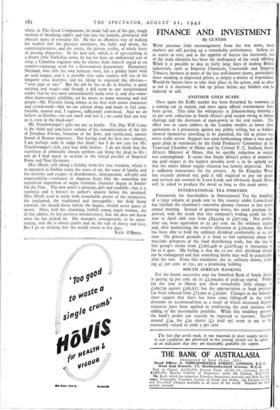FINANCE AND INVESTMENT
By CUSTOS WITH precious little encouragement from the war news, stock markets are still putting up a remarkable performance. Sellers are as scarce as ever, and as the appetite of buyers has increased, one of the main obstacles has been the inadequacy of the stock offering. While it is possible to deal in fairly large lines of leading British industrials, such as Imperial Chemicals, Courtaulds and Imperial Tobacco, business in many of the less well-known shares, particularly those standing at depressed prices, is simply a matter of negotiation. Would-be buyers have to take their place in the queue, and as often as not it is necessary to bid up prices before any holders can be induced to sell.
ANOTHER GOLD SCARE _ Once again the Kaffir market has been disturbed by rumours of a coming cut in output, and once again official reassurances have been given. This time the whisperers in Johannesburg foretold a to per cent. reduction in South Africa's gold output owing to labour shortage and the diversion of man-power to the coal mines. The effect was to cause jobbers. in the London market to lower their quotations as a precaution against any phblic selling, but as holders showed themselves unwilling to be panicked, the fall in prices was never really severe. Support was soon forthcoming when it was made quite plain in statements by the Gold Producers' Committee of the Transvaal Chamber of Mines and by Colonel F. C. Stallard, South Africa's Minister of Mines, that no specific reduction in output was contemplated. It seems that South Africa's policy of maintain- ing gold output at the highest possible level is to be upheld and that the native labour supply situation has latterly improved. Here is sufficient reassurance for the present, As Sir Kingsley Wood has recently pointed out, gold is still required to pay for goods and services not covered by Lease-Lend, and obviously South Africa will be asked to produce the metal so long as this need exists.
INTERNATIONAL TEA POSITION
Fortunately for shareholders in International Tea the handling of a large volume of goods sent to this country under Lease-Lend has falsified the chairman's somewhat gloomy forecast at last year's annual meeting. Instead of growing worse, the stock position im- proved, with the result that this company's trading profit for the year to April 26th rose from £843,504 to £927,194. Net profits, after tax, were equivalent to 25 per cent. on the ordinary capital and, after maintaining the reserve allocation at £too,000, the board has been able to hold the ordinary dividend comfortably at 12 per cent. On general grounds it is hard to feel optimistic about the war-time prospects of the food distributing trade, but the rise in this group's stocks from £1,812,428 to £2,078,345 is reassuring a' far as it goes. My feeling is that the 12 per cent. dividend should not be endangered and that something better may well be practicable after the war. From this standpoint the 5s. ordinary shares, yield- ing 41- per cent. at 13s., are a promising holding.
SOUTH AFRICAN BANKING
For the fourth successive year the Standard Bank of South Africa is paying 14 per cent. on its £2,5oo,000 of paid-up capital. Profits for the year to March 31st show remarkably little change at
£560,739 against £561,837, but the appropriation to bank premises has been reduced from £75,00o to L50,000. Changes in the balance- sheet suggest that there has been some falling-off in the trade demands on accommodation as a result of which increased depos.' resources have been applied in reinforcing the cash position and adding to the investments portfolio. While this tendency persists the bank's profits can scarcely be expected to increase. Quoted around k14, the kzo shares (k5 paid up) seem to me to be reasonably valued to yield 5 per cent.
The fact that goods made og raw materials in short supply owing to war conditions are advertised in this journal should not be taken as an indication that they are necessarily available for export.


























 Previous page
Previous page